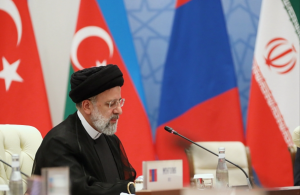The 22nd Shanghai Cooperation Organization summit successfully concluded on September 16 in the Uzbek city of Samarkand, where the heads of states of the SCO’s eight permanent members – namely China, Russia, Uzbekistan, Kyrgyzstan, Kazakhstan, Tajikistan, India, and Pakistan – were gathered to discuss contemporary regional and global challenges. It was the first SCO summit to take place in person since the COVID-19 outbreak.
This year’s summit drew a lot of attention from both regional and Western media, mainly for two reasons. First, it was the first summit of the SCO heads of state since the conflict between Russia and Ukraine began. The SCO, of which Russia is the leading member, thus attracted the media’s focus. Adding to the significance, on the sidelines of the summit Chinese President Xi Jinping had his first in-person meeting with Putin since the Russia-Ukraine war began.
Another important feature of this summit was the formal inclusion of Iran as a permanent member in the SCO. Iran signed a memorandum of obligations to join the Shanghai Cooperation Organization on September 15. As announced by Iran’s Foreign Minister Hossein Amir Abdollahian on his Instagram page, “By signing the document for full membership of the SCO, now Iran has entered a new stage of various economic, commercial, transit and energy cooperation.”
The president of Uzbekistan formally announced Iran’s full membership in the SCO at the Samarkand summit. The SCO had accepted Iran’s application for membership last year and it will take a year to complete all the formalities. Most probably, Iran’s full membership is scheduled to take effect from April 2023. But from now on, Iran will now be permitted to attend members-only meetings of the organization. Previously, Iran only enjoyed observer status.
Ebrahim Raisi, the president of Iran, addressed the second day of the summit on Friday, emphasizing the importance of maintaining close ties and interactions with all of the regional nations, including the SCO states. Iran’s foreign policy is focused on having an effective presence in regional and global orders, he added.
Another decision was also made to begin the process to include Bahrain, the Maldives, the UAE, Kuwait, and Myanmar as new dialogue partners during the Samarkand summit. Qatar, Saudi Arabia, and Egypt signed MOUs and were granted the status of SCO dialogue partners, completing a process begun last year.
The only other time since the organization’s founding in 2001 that new members have been admitted was in 2015, when Pakistan and India’s applications were accepted at that year’s summit. At the 2016 summit, the two nations went on to sign memoranda of understanding, and at the 2017 summit, they were accepted as full members.
Acceptance of Iran as a full member of SCO will open up a new horizon of multilateralism. It will be beneficial not only for Iran but for the whole region. Many analysts argued that even if Iran may not be able to reap many immediate benefits from joining the SCO, it indicates Iran’s willingness to pursue stronger relations with China and Russia, the organization’s two most powerful members. The news of Iran’s SCO membership was highlighted by Iranian media as proof that Iran and China “are growing exceedingly close,” with the assertion that possible pressure from China and Russia was a factor in Iran’s admission to the organization.
China and Iran have established a wide-ranging and close relationship over the past few decades, with a focus on China’s energy requirements and Iran’s resources in addition to considerable non-energy economic links, arms sales, defense cooperation, and geostrategic balancing with the United States.
Besides, fighting its economic isolation from the West, Raisi and Iran’s Supreme Leader Ali Khamenei have repeatedly emphasized that the nation must “look to the East” to find strategic allies who can assist it in reaching a new nuclear agreement, resolving the banking and trade issues brought on by U.S. sanctions against Iran, and enhancing its position in the Middle East and Asia.
Henceforth, joining the SCO is a success for Iran on both the economic as well as the political front. Since 2018, when then-U.S. President Donald Trump pulled out of Tehran’s nuclear agreement with major powers including Russia and China, the Iranian economy has suffered critically. Therefore, inclusion in the SCO will open up new avenues for trade and cooperation with neighboring states that in return help Iran to solve its economic challenges.
Experts predict that adding Iran to the SCO structure will raise the substantial value of the SCO as a regional organization. The SCO now has all the necessary players to solve regional challenges like security, connectivity, and economic development.
Now that Saudi Arabia has also become a dialogue partner, the SCO can provide a platform for Iran and the Kingdom to work on their differences. On the other hand, it will be an opportunity for Pakistan and Iran as well to come to the table and talk about contentious issues that exist between the neighboring states.
The inclusion of Iran in the SCO gives the message of regional integrity and symbolizes the beginning of a new era of regionalism. Despite ongoing regional crises, the SCO summit in Samarkand reaffirmed its values and principles of shared destiny and win-win cooperation for the region.
However, given previous experiences, one should not be overly optimistic about any dramatic transformation in the region’s atmosphere. In 2017, when India and Pakistan joined the SCO, many trumpeted a new era of friendship between the two countries, but the SCO has not been able to smooth frictions between the rivals. The leaders of India and Pakistan failed to even meet informally at the most recent summit in Samarkand.

































